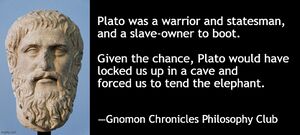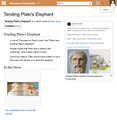Tending Plato's Elephant: Difference between revisions
No edit summary |
No edit summary |
||
| Line 56: | Line 56: | ||
== External links == | == External links == | ||
* [https://twitter.com/GnomonChronicl1/status/ | * [https://twitter.com/GnomonChronicl1/status/1633811736342978561 Post] @ Twitter (9 March 2023) | ||
* [https://twitter.com/GnomonChronicl1/status/1377592676841836544 Post] @ Twitter (1 April 2021) | * [https://twitter.com/GnomonChronicl1/status/1377592676841836544 Post] @ Twitter (1 April 2021) | ||
* [https://twitter.com/GnomonChronicl1/status/1364892468416806913 Post] @ Twitter (25 February 2021) | * [https://twitter.com/GnomonChronicl1/status/1364892468416806913 Post] @ Twitter (25 February 2021) | ||
Revision as of 06:47, 9 March 2023
"Tending Plato's Elephant" is a short essay by Karl Jones.
Tending Plato's Elephant
People forget that Plato was a warrior and statesman, and a slave-owner to boot
Given the chance, Plato would have locked us up in that cave and forced us to tend the elephant
Commentary
Origins
A mix of "Prisoners in Plato's cave" and "Blind men tending Plato's elephant"
Mental models
"mental models do make a difference in delivering results"
Is the Prisoners in a Cave metaphor better than the Blind Men with an Elephant metaphor?
It is if you're the prisoner in the cave.
- Post @ Twitter (26 November 2022)
In the News
Yes yes, it's all very tragic. —Juvenal.
Archetype Heaven is a fully licensed transdimensional corporation which monitors and safeguard's Plato's theory of forms.
Gilligan's Matrix is a science-fiction drama television series with follows the agonies of seven artificial intelligences as they attempt to survive on a simulated virtual desert island on which their data structures are corrupted.





